
Is your content marketing strategy not showing significant progress or not working? It can be because the content is created based on keywords. If that is so, it is the best time to turn to topic clusters. Topic clusters are a fantastic weapon many expert marketers use to increase their rankings in search engines.
Read on to learn all about topic clusters for SEO.
What are Topic Clusters?
Topic clusters are a set of contents or interlinked webpages built around a central topic called pillar content. In simpler terms, it is a group of articles with links from and to the main page. The several interlinking options ensure that readers stay on the website.
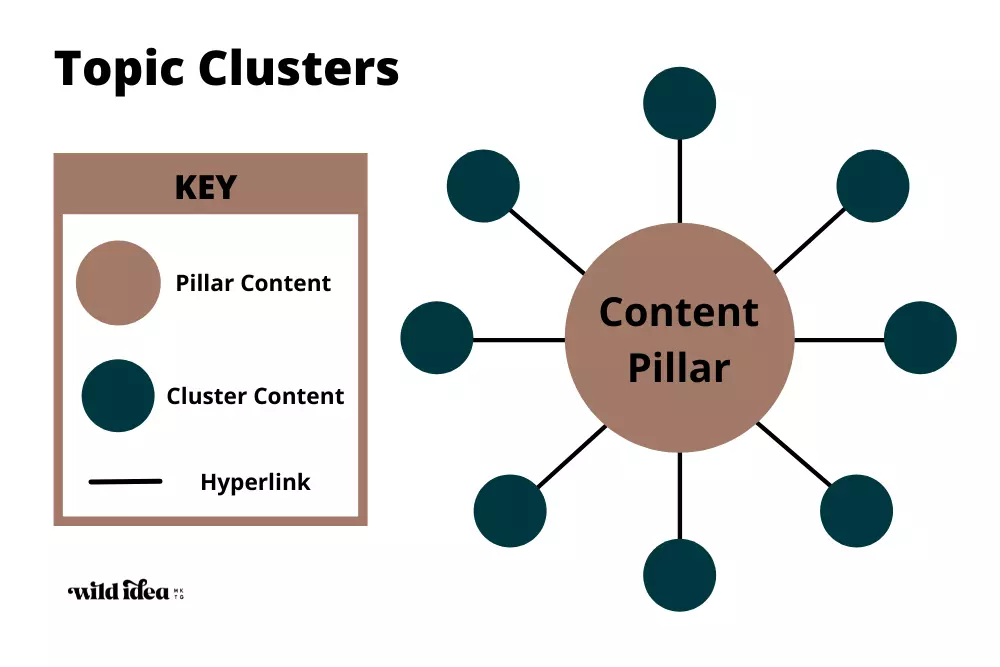
A topic cluster has three main components:
1. A core topic on the pillar page
A pillar page is an important component on which the topic cluster is created. This single page contains information on all aspects of the topic and is essentially an umbrella for all topic clusters. Topic clusters are in-depth posts that offer opportunities for research-based content on various aspects of the core pillar page topic. Each topic cluster will include hyperlinks to the pillar content.
If you have a pillar page about content marketing, you can have topic clusters focusing on SEO, social media, website content, and so on. Each cluster piece will have specific keywords hyperlinked to the content marketing page. And at the same time, the pillar content is also hyperlinked to the various topic clusters. This symbiotic relationship indicates to Google that this website has subject authority.
2. Supporting pages or clusters that cover topics
Unlike the pillar page, the cluster page focuses on the user intent. The purpose is to have in-depth content on a particular topic. It is not merely about finding a long keyword and writing about it. These supporting pages answer specific questions about the broad topic and link them back to the pillar content.
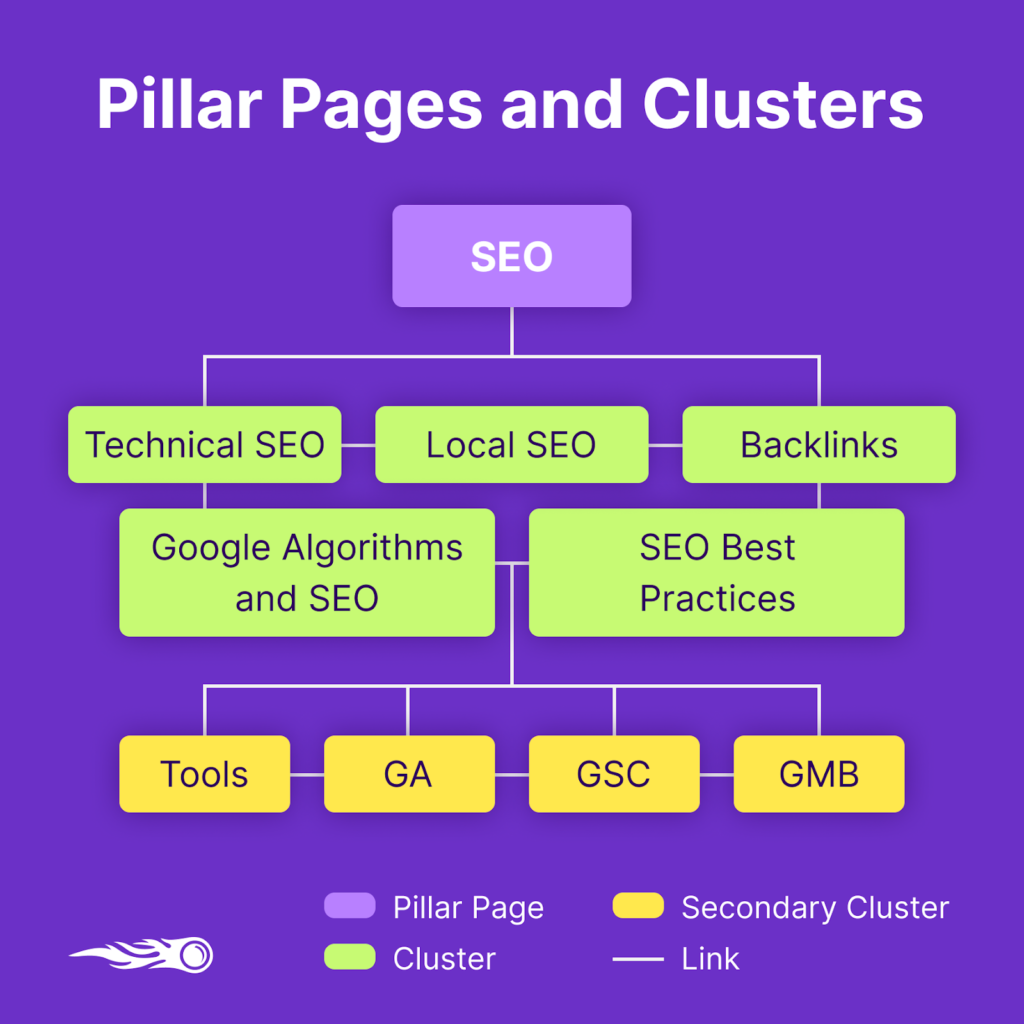
3. Hyperlinking of all the pages
The cluster pages have links that take the reader to the pillar pages. This indicates to the search engine that the pillar page is critical. Links from the main pillar page to content clusters give the remaining clusters authority. Moreover, cluster pages should include a link with descriptive anchor text. This helps search engines understand what the link contains.
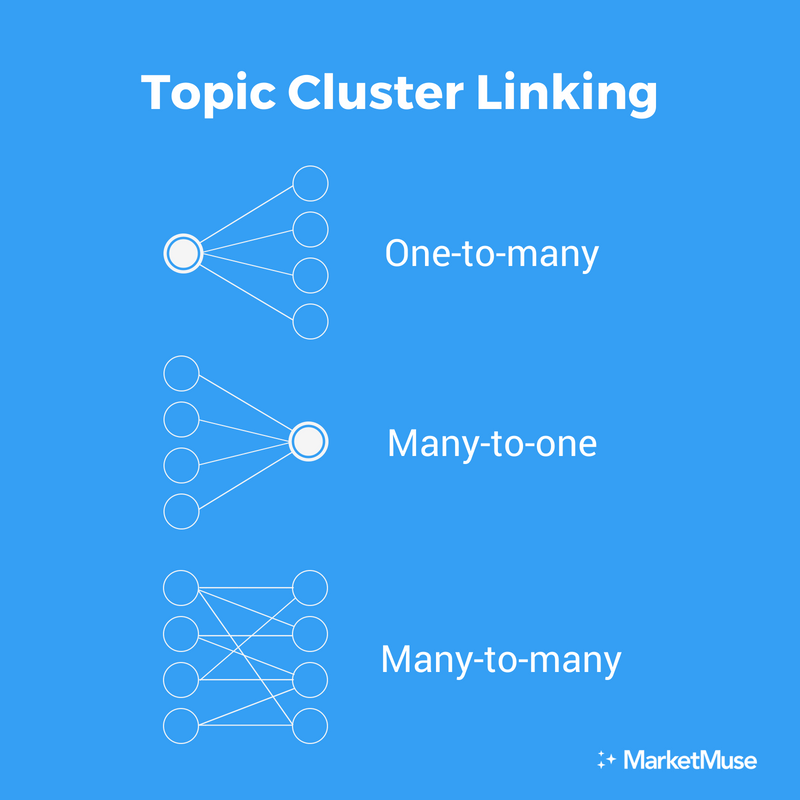
Why Topic Clusters Matter to SEO
Digital marketing trends keep changing. Once upon a time, marketers could achieve success in SEO by targeting one keyword per page. Now the trend is to target topic clustering.
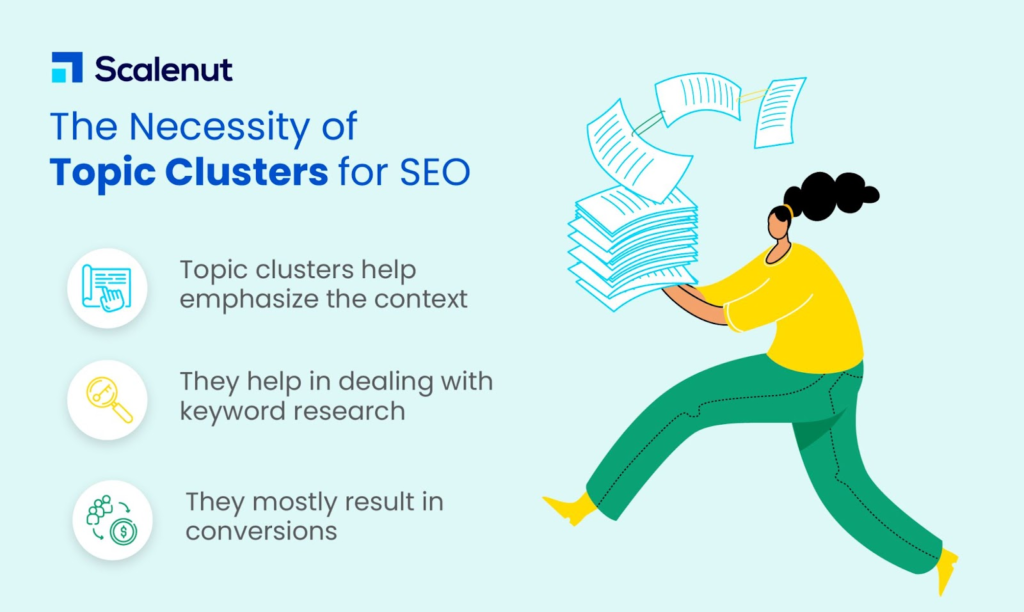
There are a few main reasons for this:
1. More personalized searches
Google and other search engines customize search results. So that means targeting a single keyword does not help. Also, the keyword rankings are harder to determine due to this personalization. Hence, there is a need to shift focus to broader topics related to the keywords.
2. Search engines have become smarter.
Search engines use advanced algorithms. So they can understand the use of multiple search terms. That means content targeting one keyword can also be ranked for other related terms.
Also, it is not enough to add keywords to content. The search engine searches for subtopics, synonyms, and even FAQs when looking for information—additionally, search engines like well-organized websites and content. The hierarchical structure of a topic cluster helps in better understanding the content.
3. Search engines want to deliver trustworthy results.
The best way to show authority to competitors is to create accurate and useful content using topic clusters SEO. Instead of targeting a particular keyword and creating content, search engines look for trustworthy and useful content.
When the content is created around a topic, it means that the site has many content pieces that address the topic thoroughly. They will perform better than those that are less authoritative. This is a great way to showcase your domain expertise.
For instance, if you have a website selling clothes and a vast topic is clustered around jeans, people will think the company has expertise in jean manufacturing. So creating a topic cluster can highlight any specific aspect of the product or business.
The implications of the above for marketers are clear. Focus on the big picture by ideating topics and subtopics.
There are many benefits to following this approach.
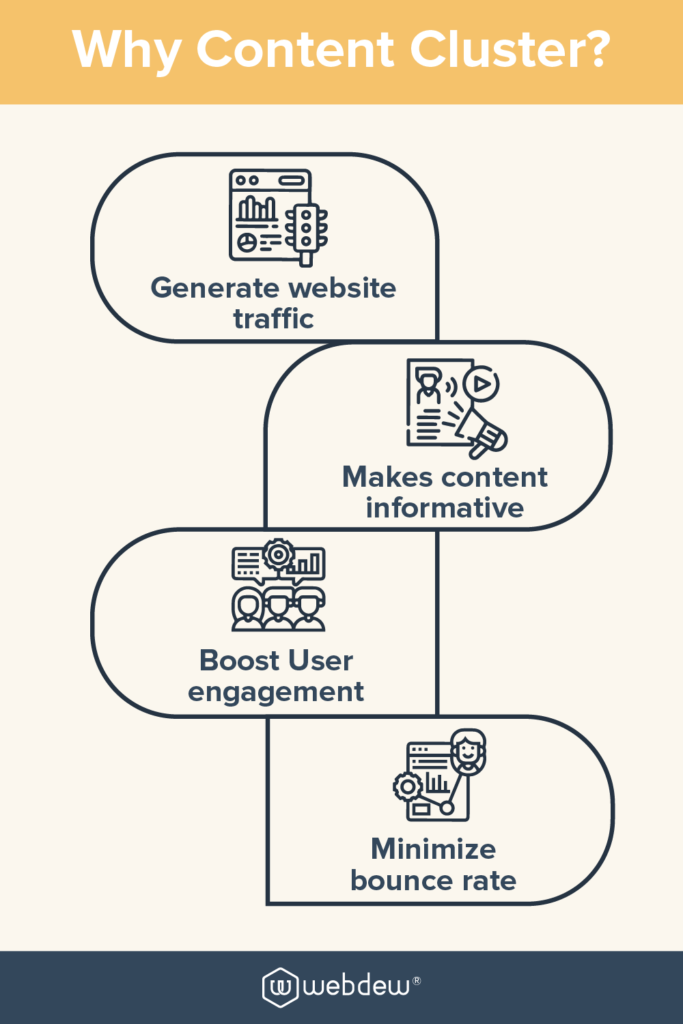
Listed below are a few:
- It reduces the bounce rate: With topic clusters, many content pieces are of user interest. The bounce rate is less as there is enough interesting content on the page. They are more likely to browse the site longer and also keep them on the site. That can also help in increasing sales eventually.
- Improves search rankings: When content is created based on a topic, it improves the rankings. Not just that, it also improves the rankings of other content similar to the site. That is because topic clusters have interlinked pages. So, when one topic does well, the interlinked pages do too. Sometimes, it can lead to multiple search engine ranking positions for the same keyword.
- Brings more web traffic: When the rankings for the site on the search engines improve, it gets more visitors. Also, users are more likely to spend time on the site. This builds a positive brand image which in turn increases traffic and conversions.
Example of a Topic Cluster
People use keywords and phrases to look for information on a topic. But, it is difficult to predict the intent behind a user search. For instance, when somebody searches for “Chinese Food,” it can be to order a dish, to cook, or just to know about it. Another example is searching for a trending term like “data analytics.” The reasons can be for starting a career, joining a course, or causal browsing.
In such scenarios, a content marketing expert or an SEO strategist will cover a wide range of topics through topic cluster content. It is a systematic approach to producing quality content where every question is answered. The topic cluster approach first identifies the keywords with high search volume. Then creates content ideas around that specific topic. The content has to be the hub of all information with hyperlinks to and from the main and subtopics.
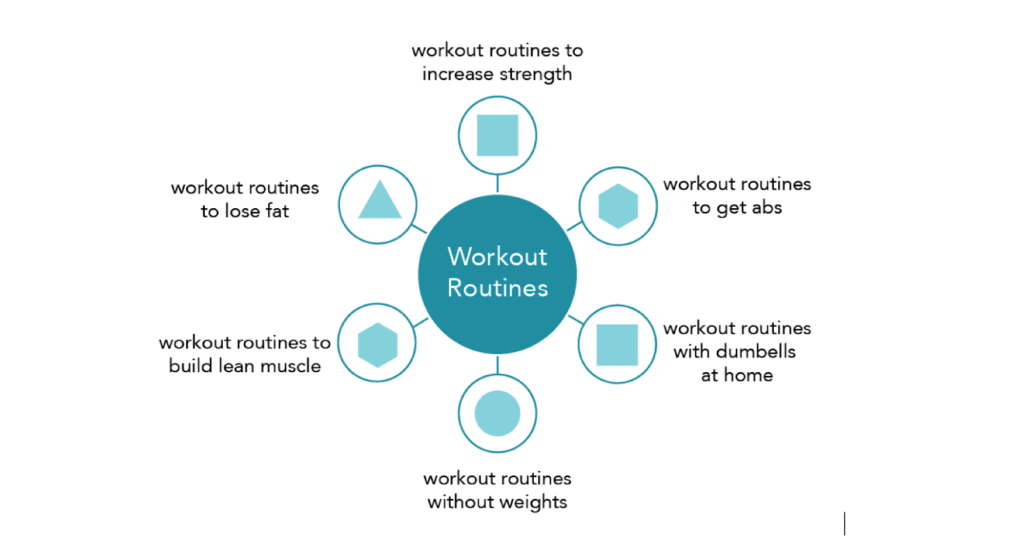
Here is an example of pillar pages and topic clusters. Imagine an e-commerce clothing business. There are many sellers online, so why should a customer opt for this business? A good answer is to become a thought leader in this domain. It helps to have an enthusiastic community of customers, models, etc., reading and promoting content. That helps in better rankings for the target keyword. The topic cluster for this store should be a comprehensive guide to everything related to fashion.
The topic clusters with a pillar page can be “Clothing trends in 2023.” The subtopics with hyperlinks can be the “Top 10 female fashion trends,” “Top 10 male fashion trends,” “Male grooming essentials,” “Female grooming essentials,” “How to style for a party,” etc.

Conclusion
SEO topic clusters effectively show authority on a topic, drive traffic and build a website. But remember that it has not replaced the keywords. It has helped marketers take a more holistic approach. Topic clusters take time to plan, research, create and publish. But it is worth it, as multiple pieces of content will eventually be created. Why not create them around a single topic and become an authority?
FAQs
No. Topic clusters are not replacements for keywords. Instead, it has made everyone rethink keyword research. It has changed the thought process of going beyond keywords and thinking about topics holistically.
Creating topic clusters boosts search and increases traffic to your website. But there is a need to track the content that is published. Because despite all the planning, some content works better than others. Many analytical tools like Google Analytics can be used to monitor the performance of the content. Many other tools collect data from various tools being used and reflect it on a single dashboard.
There are no rules regarding the length of the pillar page. It can be as long as needed. But the main topic should be present along with the related subtopics.
Latest Blogs
Explore how Google’s 2025 AI search updates triggered ranking chaos. Learn actionable strategies to adapt your SEO for AI Overviews, zero-click searches, and SERP volatility. Stay ahead now.
Learn how to rank on AI search engines like ChatGPT, Perplexity, and Gemini by optimizing your content for authority, structure, and relevance. Stay ahead in AI-driven search with this strategic guide.
Explore the best healthcare SEO services for your medical practice. Improve online visibility and effectively reach more patients in need of your services.
Get your hands on the latest news!
Similar Posts

Content Analytics
8 mins read
Google I/O 2025: AI Search Shake-Up & Ranking Volatility

SEO
5 mins read
Top 10 Agencies for Banking and Financial SEO Services Industry

SEO
4 mins read